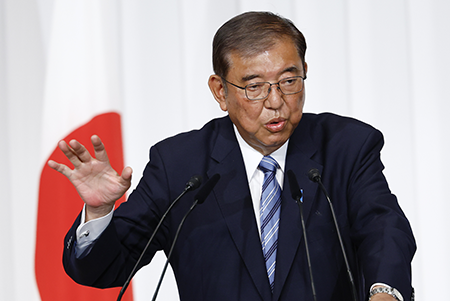Japan’s New Leader Stirs Debate on Nuclear Sharing
November 2024
By Shizuka Kuramitsu
Japan’s new prime minister, stirring controversy at the start of his tenure, proposed an Asian version of NATO that could include introducing nuclear weapons into the region to deter China, North Korea, and Russia.

Shortly before taking office on Oct. 1, Shigeru Ishiba wrote a commentary for the Washington-based Hudson Institute that took note of “the absence of a collective self-defense system like NATO in Asia” and suggested that the region is thus prone to war.
“The creation of an Asian version of NATO is essential to deter China by its Western allies,” Ishiba wrote. The issue was raised during the Liberal Democratic Party (LDP) leadership race in September when several party leader candidates, including Ishiba, called for a debate on nuclear sharing and a review of Japan’s traditional three non-nuclear principles policy.
These principles are not to possess, manufacture, or allow the introduction of nuclear weapons onto Japanese soil. They were announced by Prime Minister Eisaku Sato in 1967 and have been government policy since then although they have not been enacted into law.
In his written commentary, Ishiba expressed concern that threats from China, North Korea, and Russia will make “the U.S. extended deterrence in the region […] no longer function.”
He said that an Asian version of NATO will supplement and “ensure deterrence against the nuclear alliance of China, Russia, and North Korea” and suggested that the “Asian version of NATO must also specifically consider America’s sharing of nuclear weapons or the introduction of nuclear weapons into the region.”
Ishiba’s proposals faced domestic and international skepticism including from national security experts and government officials. Speaking at a press conference on Oct. 15, Wu Qian, spokesperson for the Chinese Defense Ministry said, “we urge the Japanese side to stop forming exclusive military alliances and cliques, be very cautious with its words and deeds regarding military security, and do more for regional peace and stability.”
In Washington, Daniel Krintenbrink, U.S. assistant secretary of state for East Asia and the Pacific, dismissed the Asian NATO idea. “It’s too early to talk about collective security in that context, and [the creation of] more formal institutions,” he said on Sept. 17, according to Radio Free Asia.
Indian Foreign Minister Subrahmanyam Jaishankar, speaking in Washington on Oct. 1, also rejected Ishiba’s vision for an Asian NATO. Noting that Japan and the United States are allies, he said that “we don’t have that kind of strategic architecture in mind … as we have different ways of approaching to the world.”
Japan’s new foreign minister, Takeshi Iwaya, was cautious. “It is difficult to immediately establish such organization in Asia that would assume mutual defense obligations,” he said at a press conference on Oct. 2. “We should consider this as part of our vision for the future over the medium to long term. For the time being, we would like to carefully strengthen the various multilateral security cooperation programs that we have now.”
Iwaya added that “the most ideal form of security cooperation in the future is the one that would not exclude any country in the region or Asia as a whole.”
Further, Tomiko Ichikawa, Japanese ambassador to the Conference on Disarmament, reaffirmed Oct. 21 at the UN General Assembly First Committee discussion that “Japan adheres to the three no nuclear principles” and “has no intention of revising the principles.”
On Oct. 7, Ishiba acknowledged that an Asian NATO would not happen overnight and said he has instructed his ruling party to set up a new committee to discuss it. This is expected to occur after the house of representatives election on Oct. 27. Ishiba’s LDP did not mention the Asian NATO proposal explicitly in its campaign pledge.
Meanwhile, Nihon Hidankyo, the Japanese atomic bomb survivors organization that won the Nobel Peace Prize on Oct. 11, spoke by telephone the next day with Ishiba. Terumi Tanaka, the group’s co-chair, later was asked at a press conference about Ishiba’s reference to nuclear sharing. Tanaka told reporters that “this is out of the question” and the fact that a political leader says that a debate on the nuclear sharing issue is necessary “is an outrage itself.”
The following day, Ishiba signaled that his government will “seriously consider” participating as an observer at the next meeting of states-parties to the Treaty on the Prohibition of Nuclear Weapons, which Japan has never attended.
